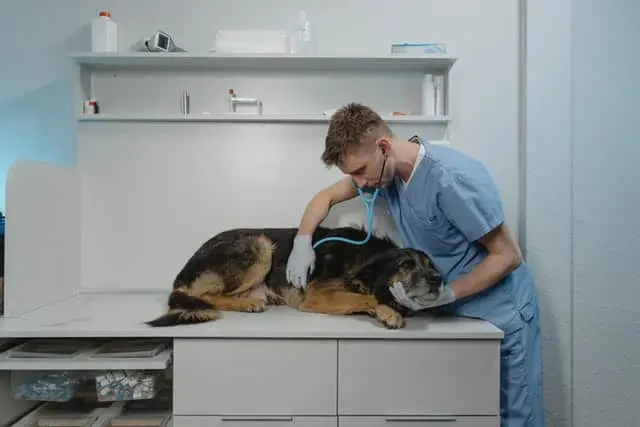How do I know if my Border Collie is dying?


Border Collies are intelligent and energetic dogs that bring joy to their owners with their lively personalities. These dogs like any other living creature also face health issues and go through different health problems. So, as a Border Collie owner, It is important for you to understand all the signs a Border Collie is dying. In this article, we are going to check all the signs a border collie is dying, how to cope with the loss of your border collie, and how you can take care of your dog by providing a comfortable environment.
Lifespan of Border Collies
Border Collies typically have a lifespan of around 10 to 17 years, depending on various factors such as genetics, diet, exercise, and overall care. Knowing this general lifespan range can help you better gauge their life stages and potential health issues.
Common Signs a Border Collie is Dying
Behavioral changes in your Border Collie dog
If you’re once lively and playful Border Collie becomes lethargic, withdrawn, or unusually aggressive, it could be an indicator of underlying health problems.


Changes in Eating and Drinking Habits of your dog
Loss of appetite, refusal to eat, or excessive drinking could point to health issues. It’s essential to monitor their eating and drinking habits as any sudden alterations can indicate a health concern.
Changes in Physical Appearance
Noticeable weight loss, difficulty in breathing, and changes in coat condition can be indicative of deteriorating health. Regularly grooming your Border Collie and keeping an eye out for physical changes is vital.
Mobility and Energy Level of your dog
A decline in mobility and energy level is common in aging dogs. However, if your Border Collie experiences difficulty in standing, walking, or seems to be in pain, it’s essential to consult a veterinarian.
Seeking Veterinary Assistance on Border collies health
Border Collies Regular Check-ups
Regular veterinary visits are essential, especially as your Border Collie gets older. Routine check-ups can help detect health issues early and provide timely interventions.
Consultation with the Veterinarian about your Border Collies health
It is very necessary for the dog owner to consult with a veterinarian on the Border Collie’s health. They can conduct necessary tests, diagnose the problem, and recommend appropriate treatments.
Providing Comfort and Support to your Border Collie Dog
Creating a Calm Environment for your Border Collie
During this sensitive time, providing a calm and quiet environment for your Border Collie is crucial. A peaceful atmosphere can help reduce stress and anxiety.
Offering Proper Nutrition to your dog
It is recommended to consult with vet to discuss about the nutritional foods for your Border Collie. Proper nutrition is very important for the health of your dog.
Pain Management and Medication for your Border collie
If your Border Collie is experiencing pain, your veterinarian might recommend pain management strategies or prescribe medications to keep them comfortable.
Emotional Well-being of Your Border Collie
Spending Quality Time with your dog
It is recommended to spend as much time as you can with your Border Collie dog. Your time is a peace for your dog, and it will feel better after spending some time with you.
Recognizing Signs of Discomfort in your Border collie
Be attuned to signs of discomfort or distress. Your Border Collie might communicate their needs through body language and behavior.
Knowing When It’s Time to Say Goodbye to your Border Collie
Quality of Life Assessment
Assessing your Border Collie’s quality of life is a difficult but necessary step. If their pain and suffering outweigh the joy they experience, it might be time to consider their well-being.
Considering Euthanasia
Euthanasia is a humane choice when your Border Collie’s health has significantly declined, and their quality of life is compromised. Consult your veterinarian for guidance.
Coping with Loss of your Border collie Dog
Grieving Process after border collies death
It is not easy to lose to lose your beloved Border Collie. It is advised to grieve and get some support from your friends and family members.
See also: BORDER COLLIE LIFESPAN: HOW LONG DO BORDER COLLIES LIVE?
Memorializing Your Border Collie
Create a memorial or keepsake to honor the memory of your Border Collie. This could be through photographs, artwork, or planting a tree in their memory.
Conclusion
It is very challenging for the dog owner to see their dog slipping near to its death. There are various signs a Border Collie is dying. You must consult with the vet regarding your collies health, and seek emotional support from your friends and family members. All you gotta do is to make sure that the last moments of your dog are in a peaceful environment, and filled with compassion.


FAQs on How Do I Know If My Border Collie Is Dying
Here are the FAQs on the signs a Border collie is dying:
How do I know when it’s time to euthanize my Border Collie?
It is very difficult decision to euthanize your Border Collie dog. That’s why, it is recommended to consult with the vet regarding your dogs overall health.
Can a Border Collie die of old age?
Yes, Border Collies can die of old age. Proper care and attention to their health can help prolong their lifespan.
Should I be present during euthanasia?
Being present during euthanasia is a personal choice. Some owners find comfort in being there, while others prefer to say goodbye beforehand.
How can I cope with the grief of losing my Border Collie?
Coping with pet loss takes time. You might get distressful, so it is recommended to seek some support from your friends and family members.
Is it normal to feel guilty about euthanasia?
As mentioned, this is not an easy decision to make. But, it is for the best of your dog. Therefore, there is no way you feel bad about this. Simply consult with the Vet and come up with better solutions.



